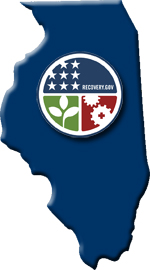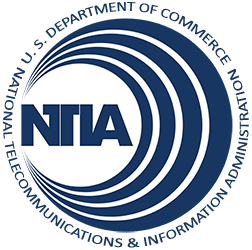The Urbana-Champaign Big Broadband project plans to construct 187 miles of fiber-optic broadband network to provide high-speed connectivity to area community anchor institutions and support fiber-to-the-home services in four low-income neighborhoods. Known as a leader in computer networking technology, the University of Illinois plans to bring its experience to bear as it works to close the digital divide in Urbana-Champaign. The project will directly connect 143 anchor institutions, including 40 K-12 schools, 17 social service agencies, 14 healthcare facilities, nine youth centers, four public library systems, and two higher education institutions. A majority of these institutions expect to receive their first high-speed Internet connection via this project. The project proposes to create a fiber-to-the-home pilot project for 2,500 low-income households to purchase an affordable high-speed Internet service plan from commercial providers. In addition, the project expects to spur affordable broadband Internet access for local consumers, including up to 50,000 households and 3,700 businesses, by enabling local Internet service providers to connect to the project’s open network.
Illinois

| Grantee | Total Award | Type |
|---|---|---|
| Board of Trustees of the University of Illinois | $22,534,776 | Infrastructure |
| City of Chicago | $7,074,369 | Sustainable Adoption |
| City of Chicago | $8,974,283 | Public Computer Centers |
| Communication Service for the Deaf, Inc. | $14,988,657 | Sustainable Adoption |
| Connected Living, Inc. (Name changed from MyWay Village, Inc.) | $4,731,442 | Sustainable Adoption |
| DeKalb County Government | $11,864,164 | Infrastructure |
| Delta Communications, dba Clearwave Communications | $31,515,253 | Infrastructure |
| Illinois Department of Central Management Services | $61,895,282 | Infrastructure |
| Northern Illinois University | $46,114,026 | Infrastructure |
| One Economy Corporation | $28,519,482 | Sustainable Adoption |
| The Partnership for a Connected Illinois | $6,554,641 | Broadband Data & Development |
| University Corporation for Advanced Internet Development | $62,540,162 | Infrastructure |
The SmartChicago Sustainable Broadband Adoption program intends to spur economic development in five disadvantaged neighborhoods in Chicago with a comprehensive broadband awareness and adoption program that will include providing computers and training opportunities to more than 11,000 residents and 500 small businesses and not-for-profits. The project intends to create public computer centers at six community centers for working families and expand workstation capacity at four Business Resource Centers, as well as provide 1,500 residents and small businesses who complete a multi-session training course with laptops and netbooks. SmartChicago plans to conduct a citywide multilingual broadband awareness campaign that will reach an estimated 200,000 residents, including ads on radio, TV, print, and city buses; outreach by local community organizations in each neighborhood; and the creation of neighborhood-based Web portals.
According to a 2009 study commissioned by the City of Chicago, as many as 40 percent of city residents lack home broadband access, making libraries and other public computer centers essential resources for employment, training, and educational opportunities. Over 60 percent of Chicago libraries now report average wait times for a computer of three hours or longer. The SmartChicago Public Computer Centers project proposes a wide-scale upgrade and expansion of workstation capacity at more than 150 locations, including city libraries, community colleges, public housing sites, workforce centers, senior centers, after-school programs, and other community locations throughout Chicago. The project will provide hundreds of thousands of hours of training, including digital literacy instruction and assistance for job seekers. The project plans a specific focus on low-income residents, at-risk youth, senior citizens, people with disabilities, and the unemployed.
Broadband’s ability to expand educational and employment opportunities is especially meaningful for Americans who are deaf or hard of hearing, a community that faces unique challenges in education and that suffers from a rate of unemployment much higher than the national average. Communication Service for the Deaf, Inc. (CSD) intends to expand broadband adoption among people who are deaf and hard of hearing and provide them with online tools to more fully participate in the digital economy. The project proposes to employ a combination of discounted broadband service and specialized computers, technology training from an online state-of-the art support center customized to the community’s needs, public access to videophones at anchor institutions from coast to coast, and a nationwide outreach initiative. Thousands will gain online access to all the Internet has to offer, including sign language interpreters, captioned video services, and other content and functionalities designed especially to advance their educational, employment, and healthcare interests.
According to a recent survey, fewer than one in twenty residents in low-income elder-care facilities in northern Illinois, use broadband services despite the demonstrated appeal for staying in touch with distant family, accessing social and government services, and improving quality of life. MyWay Village, in partnership with the Illinois Department of Commerce and Economic Opportunity and the Illinois Low Income Senior Internet Coalition, plans to transform its Connected Living Adoption and Sustainability Program, a longstanding program that ties technology, training, and technical support together in a way uniquely tailored for the senior community.
Through both traditional and grassroots awareness efforts, the project plans to engage its 23 targeted senior housing communities to teach the basics of e-mail, Web access, and other practical broadband applications. The project also intends to collaborate with local Workforce Investment Act organizations to help seniors who develop their digital literacy skills to find part time work.
The DeKalb Advancement of Technology Authority (DATA) Broadband project, a partnership between the DeKalb County Government, Northern Illinois University, and DeKalb Fiber Optic, plans to deploy a 130-mile fiber-optic network across DeKalb County and northern LaSalle County. The project is targeted to reach areas with a demonstrated need for high-speed, low-cost broadband access. The project expects to provide high-speed Internet connections between 10 Mbps to 10 Gbps to at least 60 anchor institutions, such as schools, hospitals, libraries, public safety entities, and numerous government agencies. The project will also enable broadband providers to interconnect with these facilities to provide broadband to households and businesses in unserved and underserved communities. The project design includes five networks overlaid on the fiber optic system— each network will be designed to meet the needs of a specific community: education and libraries, healthcare, the farming community, government and emergency services, and business and economic development.
Delta Communications plans to deploy a high-speed fiber middle mile network across a 23-county region of southern Illinois to address the lack of adequate broadband access for community anchor institutions in many of the region’s rural, economically distressed communities. The project plans to double Delta’s network size by constructing 740 new miles of fiber in the proposed service area. The project will directly connect 232 community anchor institutions with speeds between 10 Mbps and 1 Gbps, including 111 K-12 public schools, 28 public safety entities, 23 libraries, nine community colleges, Southern Illinois University, and 60 healthcare facilities. The network plans to offer points of interconnection for last-mile providers in all 31 communities in the proposed service area.
The Illinois Department of Central Management Services plans to deploy a high-speed fiber middle mile network across a 55-county region of northeastern, central, and eastern Illinois to address a lack of suitable broadband access for community anchor institutions in many of the region’s rural, economically distressed counties. The Illinois Broadband Opportunity Partnership project plans to construct more than 1,000 miles of new fiber while upgrading just over 1,000 miles of the state’s existing education network, Illinois Century Network (ICN), which provides a gateway to advanced online applications for K-12 schools, libraries, and non-research higher education institutions. The project also proposes to interconnect with two round one BTOP awardees: DeKalb county’s DeKalb Advancement of Technology Authority Broadband project and University of Illinois Board of Trustees’ Urbana-Champaign Big Broadband project.
Many community anchor institutions like libraries, K-12 schools, and community colleges in northwestern Illinois face limited broadband capacity, speeds, and service offerings, inhibiting the ability to serve their communities. To address this situation, Northern Illinois University is proposing to deploy an 870-mile network across a nine-county region including Jo Daviess, Stephenson, Winnebago, Boone, Carroll, Lee, Whiteside, Ogle, and LaSalle, significantly leveraging broadband technology for improvements in rural education, economic opportunities, and public safety.
The 21st Century Information and Support Ecosystem project proposes to implement a comprehensive program of computer training, wireless Internet access, broadband awareness marketing, and online content and applications to residents of 159 affordable and public housing developments and low-income communities in 50 cities and towns across 31 states and the District of Columbia. The project plans to implement four principal programs: training 2,500 youth to become “Digital Connectors” who will then provide digital literacy training to others in their communities; deploying localized broadband networks in public housing developments; developing online content and applications aimed at low-income, low-literacy audiences.
Project Components
State Capacity Building:
In addition to staffing the Broadband Deployment Council, the Partnership for a Connected Illinois (PCI) will provide independent evaluation of two BTOP projects: the Smart Communities Sustainable Adoption grant in Chicago and the Urbana‐Champaign Big Broadband Intergovernmental Consortium.
Technical Assistance:
PCI has already piloted one eTeam in rural southern Illinois. With these funds, it will build a network of eTeams across the state that will minimally consist of public, private and community leaders, telecommunication service providers, public computing, outreach and computer service centers, distance learning centers, trainers and planners. Working closely with the Broadband Deployment Council, these eTeams will develop a framework to expand broadband availability and adoption in their regions.
Other - City of Chicago Fiber Strand Map:
The City of Chicago has undertaken a limited pilot project to map the exact location of fiber infrastructure throughout the city. This project builds on that pilot and is supported by a cash match from the city. With these funds, PCI will produce a fiber strand map with the City of Chicago and will also document its processes and costs, providing an opportunity for other cities to replicate this project.
Data Collection, Integration, and Validation:
This project was originally funded for broadband planning activities and two years of data collection. In September of 2010, this project was amended to extend data collection activities for an additional three years and to identify and implement best practices.
As part of a longstanding project to connect essential community anchor institutions across the country, and facilitate closer collaboration and long-term benefits for education, research, healthcare, public safety, and government services, the University Corporation for Advanced Internet Development (UCAID) proposes a comprehensive 50-state network benefitting approximately 121,000 community anchors. The project proposes a large-scale, public-private partnership to interconnect more than 30 existing research and education networks, creating a dedicated 100-200 Gbps nationwide fiber backbone with 3.2 terabits per second (TBps) total capacity that would enable advanced networking features such as IPv6 and video multicasting. The project plans to connect community anchors across all disciplines into virtual communities with shared goals and objectives, including colleges, universities, libraries, major veterans and other health care facilities, and public safety entities, with additional benefits to tribes, vulnerable populations, and government entities.
